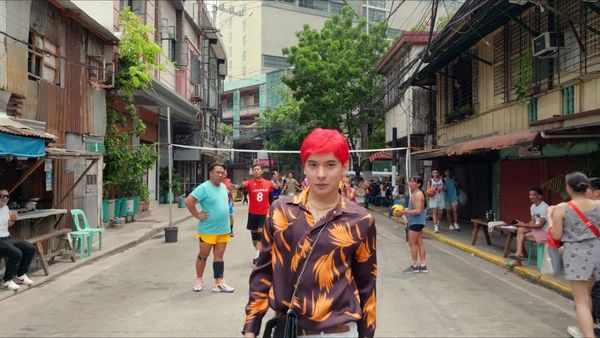 |
| Christian Bables in I Love You, Beksman |
Why does a simple thing like falling in love create so much confusion for some people? Perci Intalan's I Love You, Beksman, which opened the 2023 Queer East film festival in London, tells the story of a flamboyantly attired hairdresser and make-up artist who shocks his big queer family by coming out as straight after he falls for a beauty queen. As he tries to win her heart, he comes under pressure from her family to change the way he lives and presents himself, not realising that that was what got her attention in the first place. This lively, high spirited comedy takes on some serious issues but does so in a way which almost anybody can find enjoyable. Perci agreed to answer some questions about this for Eye For Film, as well as talking about another film at the festival, About Us But Not About Us, which he produced.
Jennie Kermode: You've worked with writer Fatrick Tabada before. Did the two of you come up with the idea for I Love You, Beksman together?
 |
| I Love You, Beksman |
Perci Intalan: Yes, I had the pleasure of working with Fatrick on our film (and series) Born Beautiful, and he is one of the writers in our company, The IdeaFirst Company, and soon I will be producing the film that he will be directing himself.
For I Love You, Beksman, the idea started with me and Jun Robles Lana, who is our creative director in our company. We were thinking of stories that were unusual and I told him about my experience in high school when I had a lot of gay friends, but I fell in love with a girl. We developed the idea further, then we brought in Fatrick to flesh it out into a script. I must say that it’s a tricky story to tell, but Fatrick did a wonderful job keeping it succinct and yet capturing both the fun and the relevance of it.
JK: There seem to me to be several themes at work in this film. Can you tell me first how you approached using the idea of someone coming out as straight to throw new light on what it's like to come out as gay (or bisexual or lesbian, etc.)?
PI: We knew we needed to talk to the LGBTQIA+ community and our allies, but we also needed to reach the straight and even somewhat conservative community. And to do that we needed to keep the film entertaining. The message must come across about just how ridiculous it is for someone to keep having to prove who he is, but it shouldn’t be done in a heavy-handed way. People had to laugh with the characters while watching, then later think of why they laughed and how in real life we do tend to box people in, even in this day and age.
JK: The film also explores how restrictive conventional gender expression is for heterosexual men. There are some uncomfortable moments when you explore toxic masculinity and violence. How did you strike the right balance and highlight those dangers whilst keeping the film fun?
 |
| I Love You, Beksman |
PI: The irony of the film is that Dali started our very comfortable with who he is and what he wanted, but then it is everyone around him that started to define his identity and the social norms that come with it to the point that he started to doubt himself and change himself to conform. We knew it would eventually have to lead him to some degree of toxic masculinity because that’s so ingrained in our psyche – about boys not crying and about boys being physical and fighting for their honour. The family of Angel represented all of that, down to the penchant for cars and sports and pencilled in moustaches. But we didn’t want to demonise them either – this is not a we vs. them movie. For all their flaws, they were also a close-knit family that would do anything for Angel. There is no villain in this movie with bad intentions, just characters who made bad choices and maybe were raised in a close-minded environment.
JK: The first meeting between Dali and Angel, and the dance number at the end, feel as if they are straight out of classic Hollywood. Did you want to have fun with those templates and make them your own? Were there elements of Philippine cinematic tradition in there too?
PI: I envisioned the film to have a very Eighties-Nineties romantic comedy vibe. Back then, a lot of Filipino rom-coms had musical numbers – some literally had Golden Age Hollywood or Bollywood-style production numbers. Even today, the singing and dancing may not be present, but scoring rom-coms with pop music still works best for the audience. I wanted this feel because for you to appreciate the film there must be a certain innocence. As a viewer, you need to first be removed from the jaded present world and embrace this colourful, musical, almost fairy-tale-ish world of Dali and Angel.
JK: Given Dali's profession, it's vital that the film looks right. How did you find and work with your costume and make-up team?
 |
| I Love You, Beksman |
PI: We worked with a limited budget, but I knew I wanted all the men and gender fluid characters to be like peacocks with each having a very visual way to externalise themselves: Dali with his fabulous outfits and his multi-coloured hair to represent his transformations, Angel’s family with the pencilled in moustaches and always in sports attire, Dali’s 'Papshiekels' with shoulder pads and everyone at the hairdresser with big hair and bold colours. In contrast, the main female characters were grounded and relatable: Angel was relatively simple except when dolled up by Dali, Dali’s mother Gemma and Dali’s friend Marga were dressed well but in very accessible ways. All the male and gender fluid characters represented identity and expression, but the female characters represented love and its simplicity.
JK: Christian Bables is perfect in the lead. How did you cast him and what was he like to work with?
PI: I had the pleasure of working with Christian in a few movies I produced, so I knew what he can do. He admitted in some interviews that Dali is one of the trickiest characters he has done – and fair enough, for he had to be very flamboyant and yet make you believe that he really is genuinely straight. The secret to Christian is that he has this very rare sincerity and even naivete about him. You instantly like him onscreen because he has no pretentions when he moulds a character. I think why he made Dali work so well was because you believe that his intentions are pure.
JK: It's great to see such a joyful film at a time when LGBTQ+ people around the world are facing a lot of hostility. Do you feel that films like this can help to win people over?
PI: I really, really hope so. We need to just start accepting people for who they are, that’s the core of it. Conservatives are getting all defensive about LGBTQIA+ individuals asserting themselves, but here you go… we have here what really is a straight love story, but you can see it’s still a story where identity must be asserted, and love must be fought for – and still, the struggle is very real. So, it’s not a matter of which side of the fence you’re at, it’s just ridiculous that we cannot just accept people for who they are and recognise love for what it is.
 |
| About Us But Not About Us |
JK: How do you feel about the film being part of the Queer East festival?
PI: It’s such an honour, especially being the film that opens it! When we made the film, we were actually afraid the LGBTQIA+ community will reject it for being so…straight, haha! I really appreciate Yi’s confidence in our film to make it the opening. And judging from the reaction of the audience at BFI that night, his bold decision paid off nicely.
JK: I understand that you were also an executive producer on About Us But Not About Us. How did you get involved with that film and what makes it important to you?
PI: Thank you for also watching About Us But Not About Us! That film is a passion project of our writer and director Jun Robles Lana. He always wanted to prove the power of a good story and all the elements of filmmaking being harnessed in a simple way -- without the bravura and the very literal ‘you have to see it to believe it’ mindset that filmmakers tend to have these days. When he showed me the script, I knew we had something special – a thriller with two actors playing three characters in one location. But what surprised even us is the amount of success it is getting.
It won Critics’ Picks Best Film when it premiered at the Tallinn Black Nights Film Festival last year, then it was selected in the very mainstream Summer Metro Manila Film Festival for wide release in the Philippines – and it won 10 of the 11 awards it was nominated for. It is enjoying an extended run in some cinemas now. Apart from playing at the Queer East Festival it is also scheduled in numerous festivals around the world. And we have a big announcement soon about a big distribution deal. It’s our “little film that could.”





















